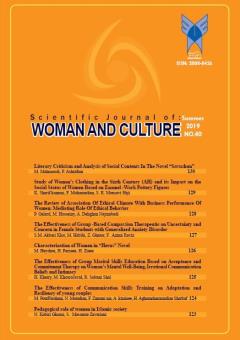Pedagogical role of women in Islamic society
Subject Areas : Religion and jurisprudence
Naeime Kabiri Ghomi
1
![]() ,
Samira Masomie Zavariani
2
*
,
Samira Masomie Zavariani
2
*
1 - Islamic Azad University Qom Branch, Department of Psychology, Qom, Iran.
2 - Alzahra University in Tehran, Department of Counseling, Tehran, Iran.
Keywords: Family, Islam, woman, pedagogical role,
Abstract :
Woman is the most beautiful expression of creation and the most effective factor in the development of the mental and physical health of children and society. The objective of this study was describing the role of women in the Islamic society. This study was carried out using a review method. Based on the clear verses of the Holy Qur'an and the infallible traditions, the woman is the foundation of all good things. While emphasizing on the high status of the mothers, their physical, mental and psychological health has drown a lot of attention, due to the health of the community and the health of the family. On the other hand, vitality, authority and family dynamism depends on the role of the mother. Also, according to experts in the field of social sciences, the central role of the mother in building the country is not covered by anyone. In addition to the educational role of the family, women can socially, politically and economically participate in the community, and contribute to the social, political and cultural development of society as a large part of the human resources present in the community. Islam not only does not prevent women from engaging in social, economic and political activities, but values it. From the perspective of the Qur'an, the woman is an effective member of the community and should play a role in social issues with men. Islam has the most comprehensive and complete attitude toward the personality of the woman.
- قرآن کریم.
- افراسیاب پور، علی اکبر، ولی پور چهارده چریک، فلورا. (1391). نقش زن در زندگی پیامبران الهی. نشریه علمی زن و فرهنگ، 4(14)، 68-57.
- امینی، ابراهیم. (1387). اسلام و تعلیم و تربیت. تهران: انجمن اولیاء و مربیان جمهوری اسلامی ایران.
- آیت اللهی، زهرا. (1381). زن و خانواده. جلد اول، تهران: روابط عمومی شورای فرهنگی- اجتماعی زنان.
- جوادی آملی، عبدالله. (1383). زن در آیینه جلال و جمال. قم: مرکز نشر اسراء.
- حرّ عاملی (1372). وسائل الشیعه. جلد بیستم، قم: موسسه آلالبیت(ع) لاحیاء التراث.
- حر عاملی، محمد بن الحسن. (1391). تفصیل وسائل الشیعه الی تحصیل مسایل الشرعیه. بیروت: داراحیاءالتراث العربی.
- حیدری، معصومه. (1379). آداب رفتار با دختران. کاشان: انتشارات محتشم.
- خمینی(ره)، روح الله. (1389). صحیفه امام (بیانات، پیامها، مصاحبه ها، احکام، اجازات شرعی و نامه ها). دوره بیست و دو جلدی، تهران: مؤسسه تنظیم و نشر آثار امام خمینی.
- درویزه، زهرا. (1382). بررسی رابطه همدلی مادران و دختران دانشآموز دبیرستانی و اختلالات رفتاری دختران شهر تهران. فصلنامه مطالعات زنان،3:35-33.
- ربیع نتاج، سید علی اکبر، روح اله زاده اندواری، عالیه. (1389). حضور زن در جامعه از دیدگاه قرآن و آیات. پژوهشنامه علوم و معارف قرآن کریم، 6، 168-145.
- سادات، محمد علی. (1372). راهنمای پدران و مادران. جلد اول، تهران: دفتر نشر فرهنگ اسلامی.
- شاهدی، سامره، فرجودی، محمد علی. (1389). جایگاه شغلی زن در خانواده و اجتماع از دیدگاه قرآن. فصلنامه علمی- پژوهشی زن و جامعه، 1 (4):111-96.
- علامه، عاطفه. (1393). نقش زن در ایجاد خانواده متعادل. نشریه علمی زن و فرهنگ، 5(20)، 51-41.
- فرهادیان، رضا. (1377). والدین و مربیان مسؤول. قم: دفتر نشر فرهنگ اسلامی.
- فهیم کرمانی، مرتضی. (1347). چهرهی زن در آیینهی اسلام و قرآن. تهران: دفتر نشر اسلامی.
- محدث نورى، حسین. (1366). مستدرک الوسائل. جلد 14،قم: موسسه آلالبیت(ع) لاحیاء التراث.
- محمدی ری شهری، محمد. میزان الحکمه. ترجمه حمیدرضا شیحی (1389). قم: انتشارات موسسه علمی فرهنگی دارالحدیث.
- مرعشیان، فاطمه. (1390). بررسی نقش زنان به عنوان مادران خانواده در ارتکاب انواع رفتارهای پرخطر نوجوانان. نشریه علمی زن و فرهنگ، 2(7)، 122-109.
- مطهری، مرتضی. (1374). نظام حقوق زن در اسلام. چاپ نوزدهم، تهران: انتشارات صدرا.
- مظاهری، علی اکبر. (1376). هشدارهای تربیتی. قم: انتشارات هجرت.
_||_
